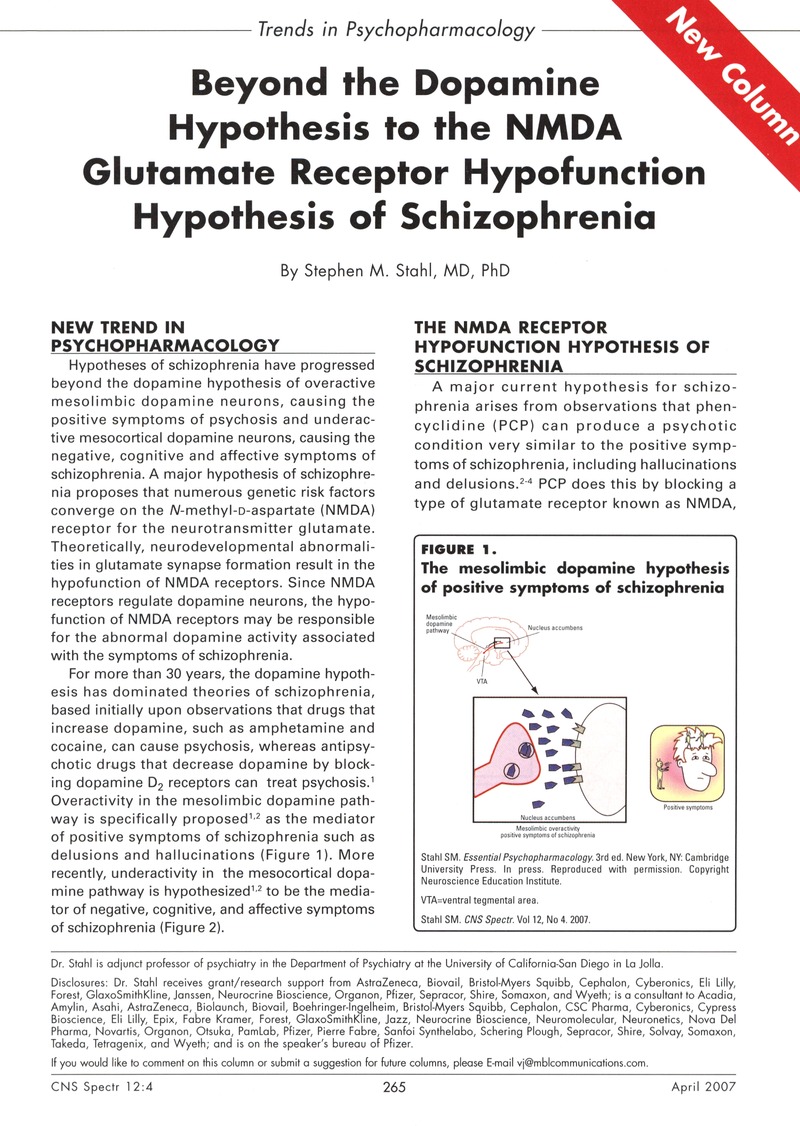Crossref Citations
This article has been cited by the following publications. This list is generated based on data provided by Crossref.
Stahl, Stephen M.
2007.
Novel Therapeutics for Schizophrenia: Targeting Glycine Modulation of NMDA Glutamate Receptors.
CNS Spectrums,
Vol. 12,
Issue. 6,
p.
423.
Stahl, Stephen M.
2007.
The Genetics of Schizophrenia Converge Upon the NMDA Glutamate Receptor.
CNS Spectrums,
Vol. 12,
Issue. 8,
p.
583.
Wenthold, Robert J.
Al-Hallaq, Rana A.
Swanwick, Catherine Croft
and
Petralia, Ronald S.
2008.
Structural And Functional Organization Of The Synapse.
p.
317.
Petralia, Ronald
Wenthold, Robert
and
Al-Hallaq, Rana
2008.
Biology of the NMDA Receptor.
Vol. 20085482,
Issue. ,
p.
149.
Fornito, A.
Yucel, M.
Dean, B.
Wood, S. J.
and
Pantelis, C.
2009.
Anatomical Abnormalities of the Anterior Cingulate Cortex in Schizophrenia: Bridging the Gap Between Neuroimaging and Neuropathology.
Schizophrenia Bulletin,
Vol. 35,
Issue. 5,
p.
973.
Kim, Dennis H.
Maneen, Matthew J.
and
Stahl, Stephen M.
2009.
Building a Better Antipsychotic: Receptor Targets for the Treatment of Multiple Symptom Dimensions of Schizophrenia.
Neurotherapeutics,
Vol. 6,
Issue. 1,
p.
78.
Fuxe, Kjell
Marcellino, Daniel
Woods, Amina S.
Giuseppina, Leo
Antonelli, Tiziana
Ferraro, Luca
Tanganelli, Sergio
and
Agnati, Luigi F.
2009.
Integrated signaling in heterodimers and receptor mosaics of different types of GPCRs of the forebrain: relevance for schizophrenia.
Journal of Neural Transmission,
Vol. 116,
Issue. 8,
p.
923.
Brisch, Ralf
Bernstein, Hans-Gert
Krell, Dieter
Dobrowolny, Henrik
Bielau, Hendrik
Steiner, Johann
Gos, Tomasz
Funke, Sieglinde
Stauch, Renate
Knüppel, Sven
and
Bogerts, Bernhard
2009.
Dopamine–glutamate abnormalities in the frontal cortex associated with the catechol-O-methyltransferase (COMT) in schizophrenia.
Brain Research,
Vol. 1269,
Issue. ,
p.
166.
Le Foll, J.
and
Pelletier, A.
2010.
Symptômes psychiatriques d’une encéphalite paranéoplasique à anticorps antirécepteurs NMDA : à propos d’un cas.
L'Encéphale,
Vol. 36,
Issue. 2,
p.
166.
Chen, Hwei-Hsien
Stoker, Astrid
and
Markou, Athina
2010.
The glutamatergic compounds sarcosine and N-acetylcysteine ameliorate prepulse inhibition deficits in metabotropic glutamate 5 receptor knockout mice.
Psychopharmacology,
Vol. 209,
Issue. 4,
p.
343.
2010.
Nutritional and Herbal Therapies for Children and Adolescents.
p.
379.
Cheng, Min-Chih
Lu, Chao-Lin
Luu, Sy-Ueng
Tsai, Ho-Min
Hsu, Shih-Hsin
Chen, Tzu-Ting
Chen, Chia-Hsiang
and
Yoshikawa, Takeo
2010.
Genetic and Functional Analysis of the DLG4 Gene Encoding the Post-Synaptic Density Protein 95 in Schizophrenia.
PLoS ONE,
Vol. 5,
Issue. 12,
p.
e15107.
Kim, Dennis H.
and
Stahl, Stephen M.
2010.
Behavioral Neurobiology of Schizophrenia and Its Treatment.
Vol. 4,
Issue. ,
p.
123.
2010.
The Brain and Behavior.
p.
14.
Moscato, Emilia H.
Jain, Ankit
Peng, Xiaoyu
Hughes, Ethan G.
Dalmau, Josep
and
Balice‐Gordon, Rita J.
2010.
Mechanisms underlying autoimmune synaptic encephalitis leading to disorders of memory, behavior and cognition: insights from molecular, cellular and synaptic studies.
European Journal of Neuroscience,
Vol. 32,
Issue. 2,
p.
298.
Maia, Tiago V
and
Frank, Michael J
2011.
From reinforcement learning models to psychiatric and neurological disorders.
Nature Neuroscience,
Vol. 14,
Issue. 2,
p.
154.
Bennett, M.R.
2011.
The prefrontal–limbic network in depression: Modulation by hypothalamus, basal ganglia and midbrain.
Progress in Neurobiology,
Vol. 93,
Issue. 4,
p.
468.
Chatterjee, Manavi
Verma, Rajkumar
Ganguly, Surajit
and
Palit, Gautam
2012.
Neurochemical and molecular characterization of ketamine-induced experimental psychosis model in mice.
Neuropharmacology,
Vol. 63,
Issue. 6,
p.
1161.
Steele, Debbie
Moore, Randy L.
Swan, Nancy A.
Grant, Joan S.
and
Keltner, Norman L.
2012.
Biological Perspectives: The Role of Glutamate in Schizophrenia and Its Treatment.
Perspectives in Psychiatric Care,
Vol. 48,
Issue. 3,
p.
125.
Tone, Erin B.
and
Davis, Jennifer S.
2012.
Paranoid thinking, suspicion, and risk for aggression: A neurodevelopmental perspective.
Development and Psychopathology,
Vol. 24,
Issue. 3,
p.
1031.





